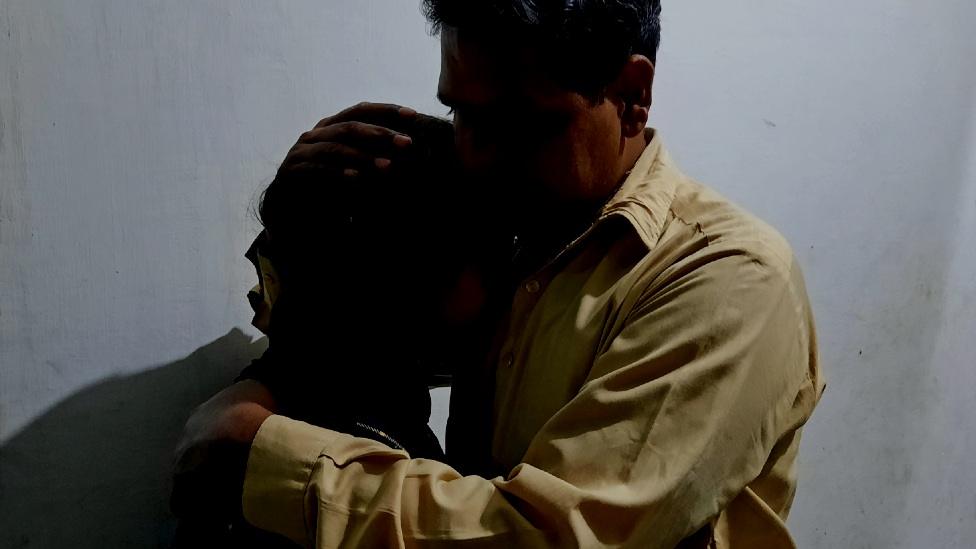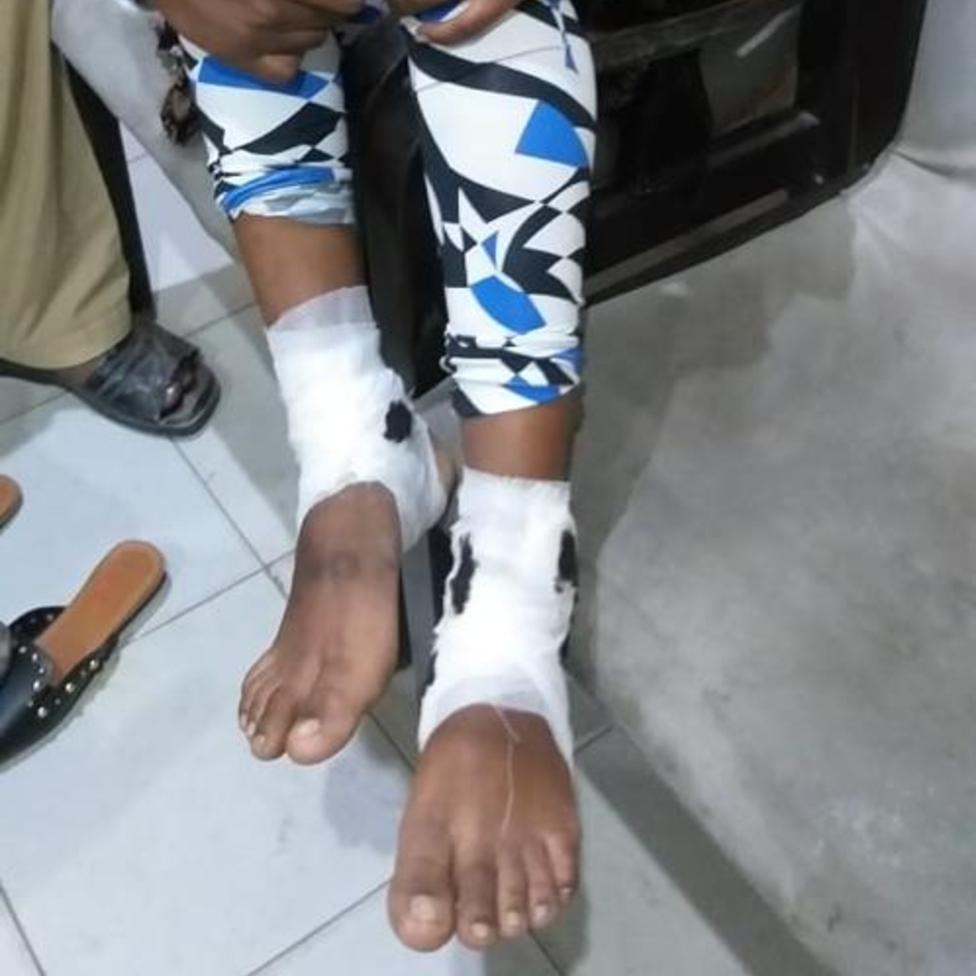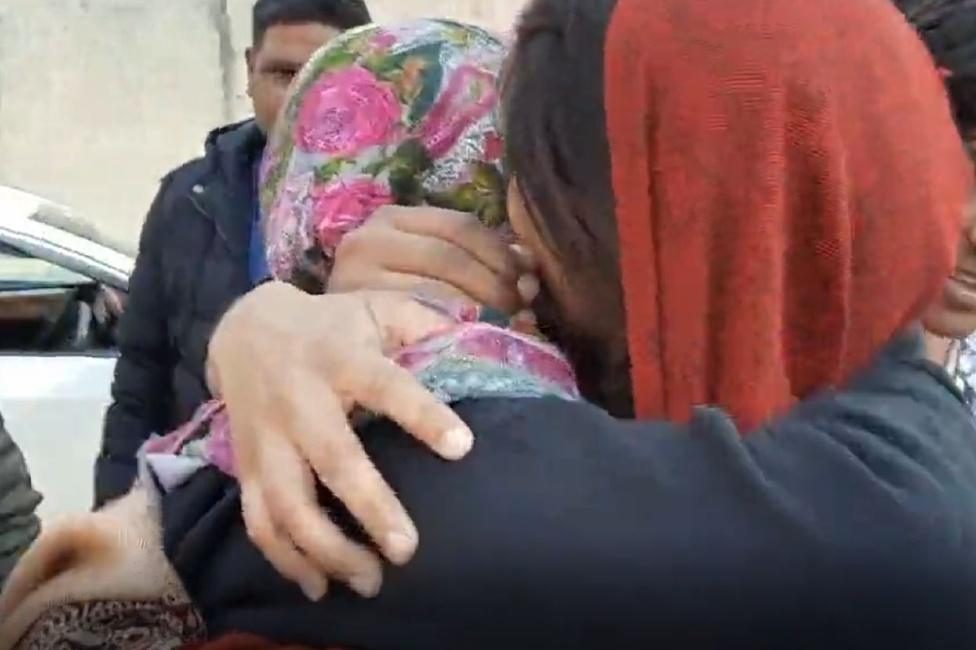Abducted, shackled and forced to marry at 12
- Published

Farah and her father, reunited
Farah, a 12-year-old Christian girl, says she was taken from her home in Pakistan last summer, shackled, forced to convert to Islam and made to marry her kidnapper. It's a fate estimated to befall hundreds of young Christian, Hindu and Sikh women and children in the country each year.
On 25 June, Farah was at home in Faisalabad, Pakistan's third most populous city, with her grandfather, three brothers and two sisters when they heard knocking on their front door. She remembers her grandfather going to open it. Then three men burst in, grabbed Farah and forced her into a van outside.
They warned the family that if they tried to get her back "they'd make us regret it", says Farah's father, Asif, who was at work at the time.
Asif went to the nearest police station to report the crime - even providing the name of one of the abductors, whom Farah's grandfather had recognised - but he says the officers showed little interest in helping.
"They were very unco-operative and refused to register the crime. Not only that but they pushed me around and verbally abused me."
Despite repeated complaints to the police it was three months before they finally registered the incident. And even then they took no action.
During this time, 12-year-old Farah, who'd been driven 70 miles (110km) to a house in the nearby city of Hafizabad, says she was raped, shackled and treated like a slave.
"I was chained most of the time and ordered to clean the abductor's home as well as take care of the animals in the yard outside. It was terrible," she says.
"They'd put chains on my ankles, and tied me with a rope. I tried to cut the rope and get the chains off, but I couldn't manage it. I prayed every night, saying, 'God, please help me.'"
This crime is committed by many people, and the authorities don't do anything
There were about two million Christians in Pakistan at the time of the last census, just over 1% of the total population.
According to human rights organisations as many as 1,000 Christian, Hindu and Sikh girls are abducted each year. Many of them are forced to convert to Islam, because it is widely believed in Pakistan that marriages under the age of 16 are acceptable under Sharia law if both of those marrying are Muslim. And this is what happened in Farah's case: she was forced to convert, then married by her abductor.
The National Council of Churches in Pakistan (NCCP) says the number of such abductions is increasing.
"It's hundreds, hundreds, many girls, many girls. This crime is committed by many people, and the authorities don't do anything," says the NCCP's general secretary, Bishop Victor Azariah.
Farah's desperately worried father, Asif, sought help from his local church, which then organised legal aid for the family.
In early December, after five months of desperate lobbying for the abductor to be arrested and for Farah to be set free, police finally took action.
"Four police came to the abductor's house and told people there that the court had ordered that I must come with them to a police station," says Farah.
On 5 December, her case came before Faisalabad's District and Sessions Courts and the magistrate sent her to a shelter for women and children, while further investigations were carried out.

The shackles on Farah's ankles left wounds that took time to heal
But once again there was bad news.
While the family waited for a final decision from the courts, police told Farah's father they were dropping their investigation - because Farah said that she had agreed to both the marriage and the conversion.
Farah then repeated this in court on 23 January. But court officials were suspicious that she may have been coerced into making the statement - and Farah says this was indeed the case.
"I said this because the abductor told me that if I didn't he'd first kill me, then murder my father, followed by my brothers and sisters. My whole family. I was really afraid that he'd do this, so I agreed to say what he told me."
Three weeks later on 16 February, nearly eight months after she was taken from her home, judges ruled that Farah's marriage had not been registered properly and was therefore invalid.
She was saved thanks to a technicality - and reunited with her family.

Farah hugs one of her sisters outside the court
Even when abducted children are rescued, their ordeal is often far from over. In many cases threats are made to abduct them again, or kill family members, and the trauma goes on.
This is what happened in the case of Maria Shahbaz, a 14-year-old Christian girl, who managed to escape after being kidnapped and forced to marry her abductor. She and her family have since been forced to go into hiding following repeated death threats.
In an effort to help Maria, a 12,500-name petition organised by the UK-based charity, Aid to the Church in Need, was recently handed in to the UK government. Signed by more than 30 British parliamentarians, including bishops, peers and MPs, it calls for her to be granted asylum.
Aid to the Church in Need's Spokesman, John Pontifex, says the situation facing many abducted girls and their families in Pakistan has become desperate.
"The trauma these children go through is often compounded by the threats they and their families face after being freed from their abductors. For some, like Maria, asylum in the UK is their only hope of safety."
Pakistan's prime minister, the former cricketer Imran Khan, has ordered an investigation into forced conversion of religious minorities in the predominantly Muslim country.
His special representative on religious harmony, Tahir Mehmood Ashrafi, recently stated: "Forced marriages, forced conversion of religion and abduction of underage girls of other religions in the name of marriages, will not be tolerated."
However, Asif's experience with the police suggests that there is a long way to go. He has pledged to continue his efforts to get the three men accused of abducting his daughter prosecuted.
Farah, now 13, is overjoyed to be at home again, and is recovering from the trauma of what happened to her with the aid of a psychologist. She fervently hopes that action will finally be taken to spare other girls the same fate.
"I pray that God will protect all children in Pakistan, that he will watch over them all."
Pictures courtesy of Aid to the Church in Need
You may also be interested in:
Many female doctors in Pakistan drop out of the profession when they start a family. Now there's a new scheme to help them to continue in practice from home using online video clinics - and it's helping poor, remote, communities too.
Female doctors practising from home.